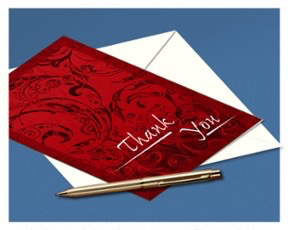You’ve been asking, so we did the research: How to write a professional business thank you card. We’ll tell you what to include, what to avoid, and then go on to the specifics of salutations and closings.
Now, before you get too worried, keep in mind that the fact that you are even bothering to send a business note of appreciation at all will set you apart from the crowd. And while there’s almost no way to go wrong when you are saying “thank you”, here are some general guidelines to keep you on the right track.
- Your tone in writing a business thank you note should be friendly and professional. Do not use slang or be overly familiar (especially if your note is to follow up on a job interview), unless the relationship is long-standing and familiar.
- Your business thank you cards should always be hand written.
- Use a pen with real ink. Felt tips or liquid ink are fine and it is perfectly OK to choose a pen that complements your handwriting. Do not use pencil, and avoid ballpoint pens.
- Be reasonable when choosing the color of your pen. Pink may be fun, but does that really convey a business-like impression?
- Check your speling! (heh). Seriously, spelling counts and there’s no excuse for misspelled words in a hand-written corporate thank you card. Just write a quick rough draft in any word processing application and spell check first. You can even use the spell check function in gmail or most mail clients to eliminate spelling errors.
- Writing up a quick rough draft of your thank you card will also save you from having to toss out thank you cards with mistakes or those that “just don’t sound quite right” once you’ve written them.
Now on to the Nitty-Gritty-Miss-Manners part of writing proper thank you cards for business:
- Salutation: Address the recipient as “Dear [Name],”. In general, it’s best to err on the side of caution and choose the more formal path: “Dear Mr. Smith,”. It is also acceptable to say “Hello Mr. Smith,”. This is not the place to say “Hey Bob,”.
- Express your gratitude: A simple, one line sentence expressing your thanks for the event/meeting/ feedback, etc.
- Continue with something specific about your conversation or meeting: Be sincere, and clearly express your appreciation for the giver’s time and effort by describing how it helped you.
- Closing: You have a few choices here.
- For someone you don’t know well (an interviewer for example), “Sincerely,” or “Yours Sincerely,” is the most appropriate.
- “Many Thanks,” or “Best Wishes,” is perfectly appropriate for someone with whom you are more familiar (a manager or co-worker).
- Save the “Love from,” for friends and family!
Are you a job seeker? Pay close attention:
An employer we read about recently, said that following up with an appropriate business thank you card is almost mandatory these days, and careerbuilder.com even lists sending a prompt thank you card as an important part of your post-interview strategy (see item #5 and #10 in their list of “10 things to do after the interview“). A well-written (hand-written, of course) business thank you note sent to your potential employer will demonstrate your maturity, responsibility, and ability to follow through with the important details. It’s also something many of your peers will neglect to do—what better way to stand out from the crowd? (We hope it goes without saying that you should be careful not to sound like you already have the job?)
And always be sure to write a thank you note to anyone who has provided you with a letter of reference.
For job seekers under 35, or anyone who knows one, here’s an interesting article to chew on, (The Start-Up of You), while you write out those business thank you cards to your most recent interviewers!
Do you have questions or your own suggestions for writing business thank you notes? Enter them in the comments (or just send us an email) and we’ll do our best to include the answers and share your tips in Part 4 of the series.
Next up: Part 4 – Answering your questions + a list of great opportunities for sending thank you cards and business note cards to nurture relationships with the customers you serve.

